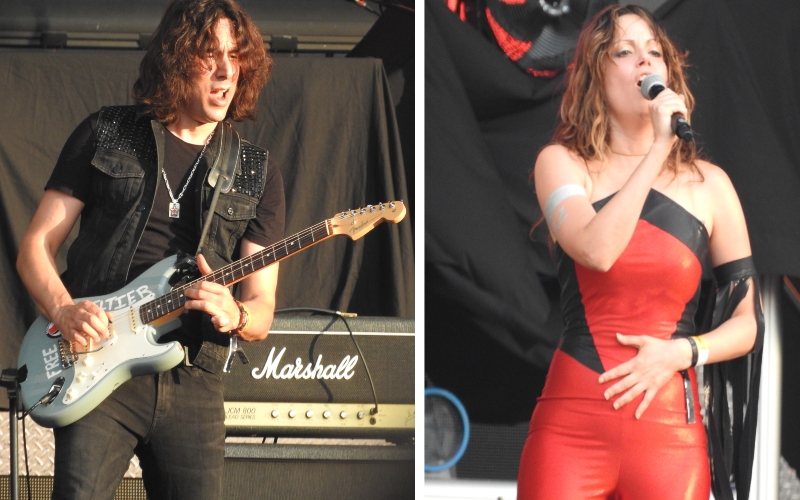
They proved out to be one of those very pleasant surprises, which are not very often the norm. Expecting the appearance of the legendary Guns ‘n’ Roses, it was probably the Greek public’s turn to be captivated by the appearance of a band that (because of the lack of a record label and manager, as we were informed) was not particularly known to most of us. The “explosive” Puerto Rican performer Delila Paz and her inseparable “fellow music traveler” Edgey Pires, who are the “soul and heart” of The Last Internationale, it’s safe to say they “stole the show”. Soundcheck wasted no time and sought out the two artists, so that they could introduce us more deeply into their way of thinking, “operation”, and what they stand for, in what turned out to be an “exquisitely fruitful” interview with Stavros Vlahos.
We are here in Soundcheck.Network, our online magazine and we are very very glad to have with us, Delila Paz and Edgey Pires from The Last Internationale. Welcome in our magazine!
DP: Thank you for having us!
Thank you for accepting our invitation! I would like to start from your breathtaking, I would say, performance in OAKA with Guns ‘n’ Roses. How did you experience that, the adverse weather conditions? I can say that, from everybody who was near me, your performance was breathtaking, our side. How did you receive that?
EP: Thank you so much!
DP: I think for me, for both of us, it was one of the top shows we have ever experienced and played, because there are different elements that were magical, it’s like the crowd was magical, there were magical moments, the whole venue itself, kind of reminded me, like, I don’t know, Freddie Mercury’s, or ‘70s concerts, or Woodstock, just like looking at the crowd. From the stage to the crowd. And the heat didn’t really bother us, I guess the adrenaline, you don’t really think about the heat. I don’t know if the crowd was bothered, because there were there for a long time, sitting out in the sun.
EP: It bothered us off the stage, didn’t it? We got out in the day early and it was hot, it was like grueling hot, but on the stage you don’t really think about the heat, but Delila said a comment when she went out in the crowd, you said it was like a furnace or something, what did you say?
DP: Yes, I did! When I stepped out and went down into the crowd, it was like a hot, I guess it was the body heat mixed with the heat in the sun. I never felt anything like that, it was like hotter than the sun, it was like, man, these people’s body heat was almost like a …. thickness.
And you felt it more intense because you became a part of the crowd at the end of the show. How was that?
DP: Maybe we were all, like, hallucinating at one point. (laughs)
Did it just happen or you want to go near the crowd and be a part of them? Has it happened again?
DP: Yes, I mean, almost every show there’s a crowd interaction, crowd comes onto stage, which I want it to happen at the end of the set or we go out to them. I don’t think there should be stages anymore, that we should develop something new.
EP: All is on!
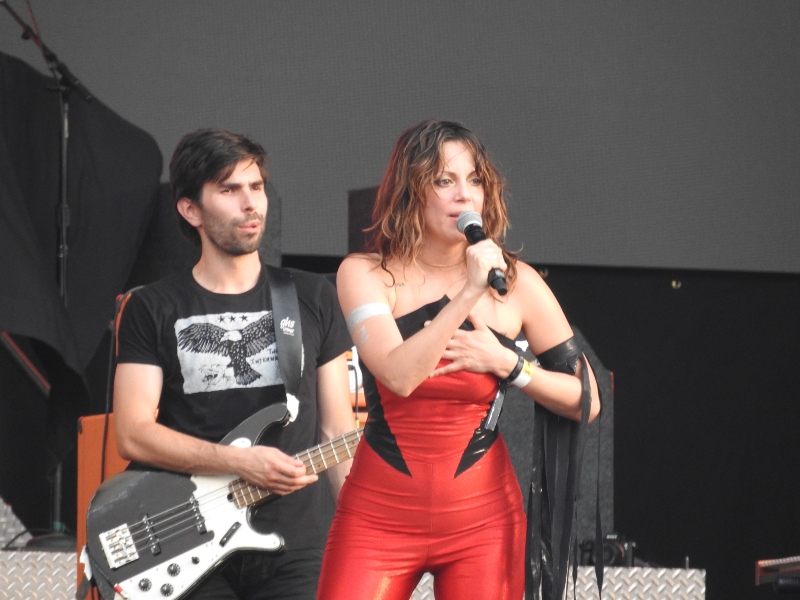
Great idea!
EP: We want every show to be different. We want to be in a certain level of spontaneity and Delila is certainly spontaneous and it’s a band, with our playing, we want to extend verses or choruses, we want to be on a high alert and just follow Delila. If she wants to extend a verse, we do, if the chorus should go longer, we just follow her, if she wants to jump to the crowd, we know to keep playing longer. There’s a lot of improvisation. The challenge for us is doing it within a very strict 40 or 45 minutes. I think it’s forty minutes, right? Within a forty minutes’ set you can’t go a minute over.
DP: I had no idea what time it was, if we ended earlier or late. I don’t know how bands do it. Do they have a clock and someone’s just talking to them?
EP: We happen to always know. It’s weird, cause we don’t look at the time. Internally we just know that this is it. Get off the stage! We’re never late. If anything, we’re over a minute or so. It’s usually on time.
My sense is, I’ve heard some of your stuff, and I believe you have some passionate studio recordings, but my sense is that you were born for the stage, your performance showed me that. Do you agree? Am I near your feelings?
DP: Yes, there’s nothing like the stage! It’s cool to experiment in the studio, you can add extra instruments and that is like a different feeling, but the stage….You’re playing the same song, over and over again, each show, but it doesn’t feel like it’s the same song, it feels like it’s fresh and new, every time.
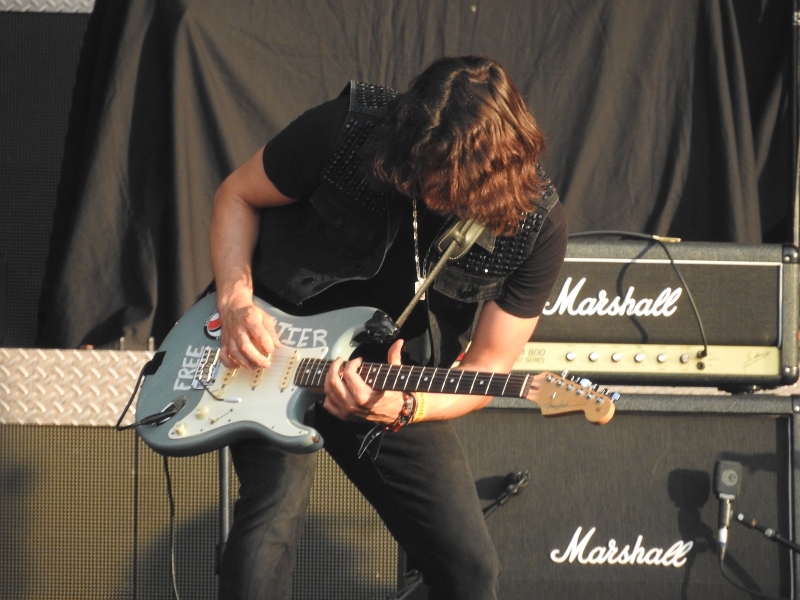
You can jam in the studio and have fun but I saw Edgey was giving it everything there. I believe you are a great performer, so I think it was really intense, from my side.
EP: I love live recordings of even my favourite bands and I prefer live recordings, as long as the recording is decent, I prefer it over the studio records. That’s why I love a lot of Jimi Hendrix live stuff, because it’s different. It always sounds different, the songs are played in different tempos, it was much more free back then, whereas today a lot of bands use clip tracks and everything is lined up with backing tracks and the show is the same every single time. In that respect, no, I probably prefer the studio tracks. I don’t need to hear a worse version of the song live, cause it’s the same exact arrangement, same everything, same singing as the record. What I like, that Delila does, is that she’s always adding things, adding layers in each song. One of our songs, for example, “Wanted Man” which we played at the festival, she added a new intro which isn’t at the record, then she adds a new vocal melody at the end, she does that with almost every song, she adds new vocal melodies and the parts start to change, the solos changed. “Soul on Fire” on the record doesn’t have a solo, while it has like a 3 minutes solo while she is singing and it’s different every single time. So for us, we want to record this stuff, we want to record our live shows, it’s a matter of getting the right person to catch it, which we kind of did, so there might be a live record coming out soon. We are setting tracks at the studio, so we are probably mixing a compilation of our live shows from the past two years or so.
The downside of live recordings is that, for example, we did a cool version of one of our songs called “1984” in Paris. We were recording it and I popped a string, right in the middle of a solo, and it’s a Strat with a floating bridge, so once a string breaks, the whole guitar goes immediately out of tune. It just sounds horrible, felt for two seconds, “What happened?”, I left down my guitar. If you are at the show in the venue it’s cool, but if you are only hearing it, you are “what the f@ck happens to the guitar player”? There’s no guitar for like ten seconds or fifteen seconds, guitar is back on, then you hear the crowd scream. If you are not watching the show and you are hearing it, you are left to wonder, “what the hell just happened?”. That’s the downside of live recordings.
Great news! Well you said Jimi Hendrix and I would say that your music travels us in other decades for sure. What could be an ideal decade to live in, if you could turn back time?
DP: If I could turn back time….I don’t know, I don’t believe in time.
Wow!Ok….
DP: I think there’s something special about that Woodstock era, in the freeness of it, I mean we want to bring that back, that’s the whole goal of us, bring that back but in a way that’s not copying. Loving that era so much, like we are just like living in that era…..But because we are in our time right now and we have to live in this time. So, how do you bring that feeling of Woodstock, cause it’s something special that you always talk about….
Yes. And you did (with your sound/performance)!
DP: Why can’t we have that now? We can, if we just let ourselves go. I don’t know. It’s just, experience the moment. And talk about things that matter, socially conscious. Things that need to be in our vocabulary, things that need to be in the music and come out.
EP: We are far away from the ’70s, you say. ’60s.
DP: It’s possible to bring that again. That energy can be again in music, so….
EP: In fact, we just had a discussion, just two days ago. I think the drummer said, “Man, I wish I could just go back and live in the ’70s. But, I said, hold on a second, “What was it like for a black musician touring the south of the United States in the ’70s?”. Maybe we don’t want to go back. Maybe we talk about the ’70s too much and the reason, there was so much politics in music, was because there was so mush oppression, not that it doesn’t exist today. Trust me, there is plenty of oppression today but I think, what Delila wants to bring back, is that feeling of solidarity that was present in the population, they forced the rock bands to be political, they had almost no choice but to be political, because they kept being pressured by the fans and the public. That sentiment of solidarity doesn’t exist today and it’s for a reason. They need, the powers that be, the ruling class, made sure to divide us as much as they could, since the ’70s.
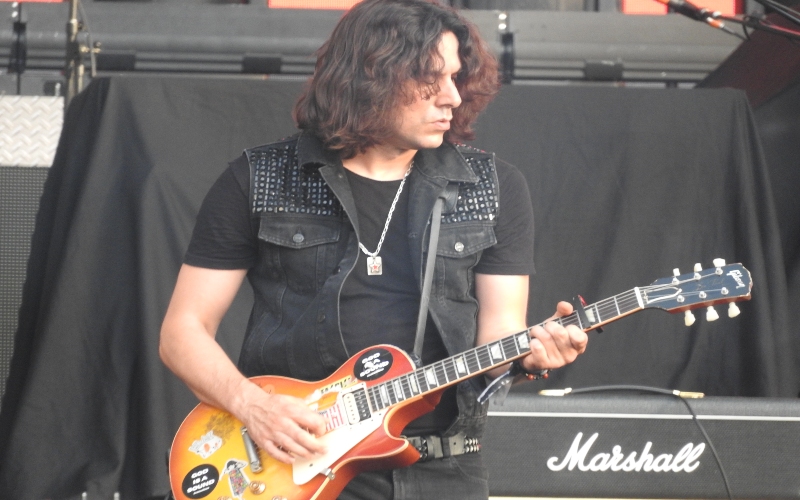
Yeah….Understood. How did the support concert with Guns ‘n’ Roses come up and how did you experience them in the same stage?
DP: I don’t know how we got the gig, exactly. We have a really good agent, that believes in us and he is their agent. He does a lot of the big, huge, all the rock stars. His name is Rod MacSween. He really believes in us. We don’t have a manager or label….
Yeah…..You said that, I remember!
DP: There’s a small group that believes in us and the fans, the people. These songs, going into a show like that, because you know that the audience, the songs probably were engrained in them, all the songs of Guns ‘n’ Roses, they know it’s in their heart. They’re gonna be singing all the songs. I know the songs and they have a place in our hearts too. We grew up and we listened to them. I think that’s another reason why we go on stage. Have to connect with these people, because they’re going to listen to somebody else, if they don’t listen to you. Just give them experience. You don’t know me. Just give them experience.
Ok. I know that you are from New York, you said it in the concert, as well, that you don’t have a label, you don’t have any manager and that’s very interesting. The other members, are they constant members of the band? The other two?
EP: No, it’s Delila and I. We’ve been hiring musicians throughout the years. It’s now that we have found a group of people that we feel comfortable with, cause we feel a comradely with. Like musicians that really are in it, they’re in the moment and in the zone with us, like they’re not elsewhere, they don’t consider themselves “hired guns”. It’s kind of like a family situation, if you will. We’re best friends, we’re family. It’s deeper than a band, anybody can join a band or be in a band. It’s easy. Starting a band is easy. The setting of the band sounds good, that’s the hard part, because it takes so much work, and so much practice and dedication, and the psychology of it….. Everybody has to be in the same wave, in the same page. It’s the same thing like a sports team or whatever, like psychologically everybody must have the same vision and the same mindset and the same goal. If one person doesn’t, it will destroy the entire thing. For us that was the hardest thing to find. People with the same mindset and the same vision, and the willingness and the drag to do it. Once you find that, that’s the hard part, you got it. The musical flow. Everything else will come. Any obstacles….. There will be small hurdles, you just jump right over them. Cancel flights, no problem. Rent a van. There’s no vans, I’ll walk to the gate or whatever to make the show. If you have people of that mentality, it’s a military unit. For us that’s what’s important.
DP: The show and the working, like how we all wanna work. Get better as a band. After the show we’re always not celebrating, “Wow, that was so awesome!”.
EP: Kind of do that. A little bit.
DP: Yeah, but it’s not just that. What went wrong, what could be better….
EP: Yeah….We’re very hard on ourselves. Very hard!
DP: I guess that is the New York attitude.
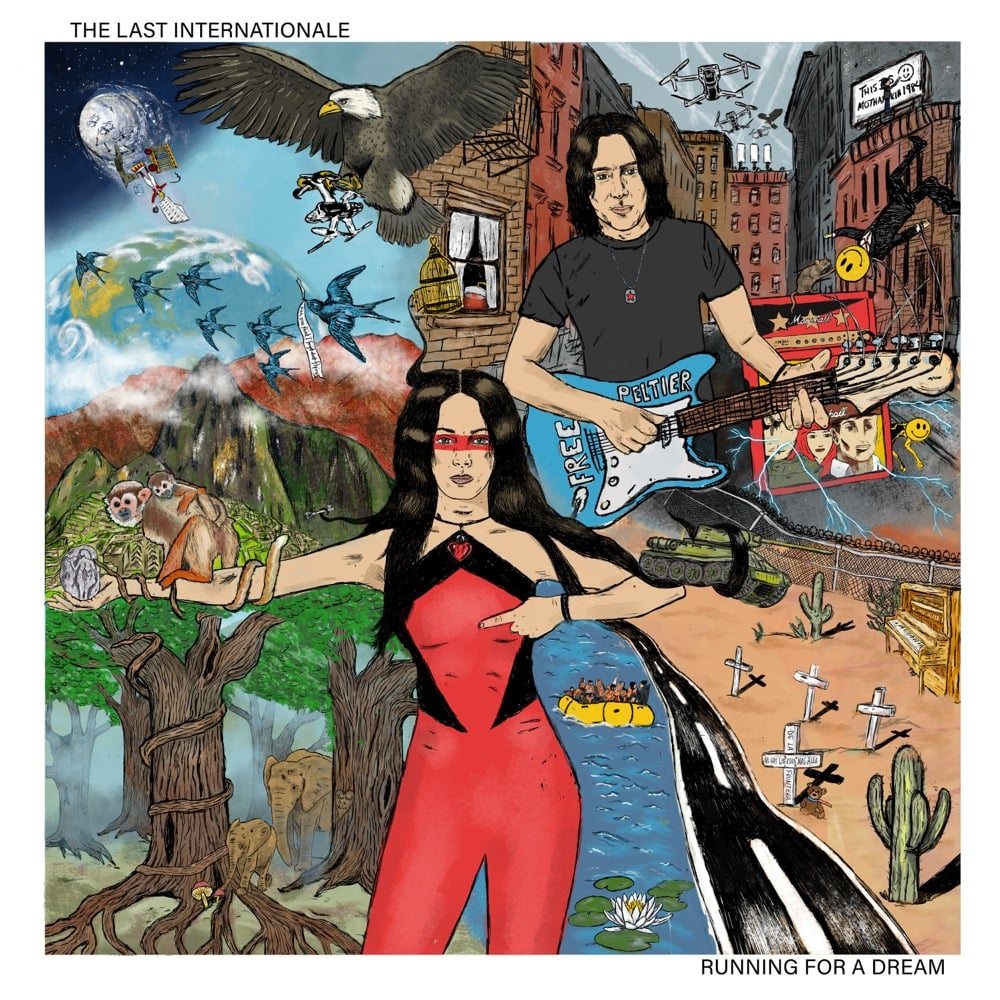
You have a new album out, your third one, “Running for a dream” and I saw the artwork is yours Delila.
DP: Yeah, Edgey bought me an iPad, with an Apple pen for Christmas, last year. I had a big drawing tablet, where I started doing artwork. And then when he bought me that, it’s portable, I was on it for weeks. Just like everyday, for hours. “Don’t talk to me! I’m drawing…..”. Let me show it.
EP: Part of it was torture, even for me watching. And when she thought she was done, I said “No, you’re not done yet”. “What do you mean I’m not done?”. “You have some space to fill over here” or “What else didn’t you include in this cover?”, “What modern issue or something you didn’t cover, that’s not on the album cover?”.
DP: Is this gonna be video (Bringing the vinyl & showing the cover)?
Yes. Very nice. I know. I saw it. It’s very nice for my taste.
DP: I got the vibe and the idea from Diego Rivera’s, the “Man at the Crossroads”. It’s a political painting, it has pieces. Every section is something else. It’s surrealism.
Tell me a few things about the new album. A few thoughts of yours. And also about the collaboration with the “human drum machine”, as I say, Eloy Casagrande from Sepultura.
EP: I never get tired of this (cover). I could look at it for hours.
It’s really nice. Really, really nice.
DP: Joey Castillo too, played with QOTSA. All drummers.
EP: He went on a tour with us too, as we were recording the record, so we would be more connected when we made the record. We’re very happy with the results. Working with him on the studio was very quick actually. He’s very open to any of our ideas, any ideas he had, there was no ego, so all ideas were free flowing and there were some things that came out one take and there were other songs that we “worked to death”. Like we changed drum beats 30 times or the drum fill was never right, so we had to go back into the studio, make sure we had the right drum fill. Then I was programming drums at one point, I programmed drums for an entire song, then we had to re-cut the entire drums…..It was crazy! Then it’s covid. Covid split everybody up, couldn’t go at the studio, everything shut down….
DP: I did part of the vocals in the ….closet.
EP: I can’t tell the difference cause some of them were in the ….closet, some of them in my mother’s attic in New York, some of them in your mother’s, some of them in this, literally what you see right here……
DP: Oh, “Hero”, we have a song called “Hero”, I did right here.
EP: Somewhere in a friend’s house. We were at a friend’s house and we connected a mic and started singing. And some of the vocals were added in the studio near the beach.
How does this thing without managers, no label, work? Of course it’s an obvious choice of yours….Someone can find your work only from your e-shop, I believe, right?
DP: We are in all digital platforms. But right now it is only distributed through our store, which we mail out ourselves, also. It’s very DIY. We have a U.S. store that my mum runs actually. We run Europe and rest of the world. We have a lot of trouble actually sending stuff from Portugal, like Greece is Ok and everything in the E.U. but outside the union…..it takes forever to get there.
EP: Sometimes there’s delays. How many days it gets there, depends. Like to the UK, because of the whole Brexit thing. We go to the post office every weekday. Like Monday we’ll be at the post office. Even on tour, we are stopping at the post office.
DP: Cause we had the promo of the album. It was delayed the vinyl getting to us, so we didn’t have time to mail everything out. There were a few hundred orders. So, we had to do it while we were on tour in Europe. So, after every show we were packing packages in hotel lobbies. In Poland we mailed out a 100 packages and it took us 4 hours after the show. We were at the post office for 4 hours.
EP: Like 3 in the morning or something.
When do you rest?
EP: We got sick too on that tour. We played sick. I thought I was dying.
DP: It was maybe too much. Because the DIY thing is very liberating and exciting, but you got to manage yourself. A musician’s brain, most of us don’t have the organized part, so it’s like trying to work on that part.
EP: Yes, but that’s not true. We have the organised part.
DP: I don’t have the organised part.
EP: You kind of do. I certainly do. You do. The problem is, we consider ourselves functional musicians. Not kind like Springsteen. He’s not this functional. I’m sure he can make his own breakfast. A lot of musicians, a lot of rock stars need someone to ….feed them. We don’t have that. I’m exaggerating a little bit, but we don’t have that problem. We run our own web store, we run our own web site, we shoot our music videos, we edit our own music videos, we market and promote our own stuff, with the very little money we have, so that’s why the merch store is so important. Profits or anything we make from it, everything from merch goes right back in. So goes back in to have more merch. We make our own T-shirts. I made this one I wear right now. We make our own handy T-shirts for the merch store and we go to the post office and we mail it out, and what’s frustrating is that the post office we were on tour in Europe, they don’t know, they can’t figure out how to deliver our package. The musicians do all this work, do all this stuff, we produce all record, we did all this s@&t, I can keep listing the things that we do DIY, because we can’t rely on other people and then when we go to the post office, all you gotta do, get this thing right here, from point A to point B. They can’t figure that out, and it’s the more frustrating thing ever.
DP: Yes, cause there is so much bureaucracy.
EP: There is bureaucracy. Remember in Belgium….? Take your three bags of packages, go to that computer, that’s been sitting in that room since 1983, and type in, each person’s address, everything, type in your address and typing was six and a half hours, cause it was like this old touch screen system, nothing works, you know what I am saying…..It will take you, literally, three months to mail out those three bags of packages. So we couldn’t mail out our packages, they go back into the van, we go to the next country, there’s another excuse as to why they can’t mail it due to their system, packages go back into the van, the orders are growing…. Now we have a van with more packages and more online orders than we do equipment and guitars for the tour. It was a total disaster. Though we managed to get through it. I think that is the high level of organisation I meant we have.
First thought that comes to mind, now that you are saying all this stuff you are doing your own, is what had happened with Napster and Lars Ulrich of Metallica, many years ago, who was, back then, blamed…..And, I believe that Metallica don’t really need the money from the LPs, back then and of course now. For “smaller” bands, this is crucial, for this great amount of work produced by you, in all these ways and everything, to go to the “customer” and the audience and get that physical copy, because we now have all these streams, it’s different to have this copy. This is a masterpiece for me. From the artwork, from the music that I ‘ve heard. Everything…..
EP: Thanks!
DP: Thank you! I think that getting a record, physical record is a special thing. I do also listen to a lot of digital music, too. Cause it’s easier. It’s just there.
EP: Yeah, like in the gym.
DP: But I love getting a vinyl. In your hand….See the artwork.
EP: For me, the most important thing other than the actual sound of the record, is the artwork. You don’t have to sell this. The artwork to me sells itself when someone looks at it, and if they know that the singer drew this. Because, you can pay someone a thousand dollars, ten thousand, a million dollars to do the album cover, but for me it wouldn’t have the same sentimental value as if Delila did it, and the way. She’s never done that before, ever….. This is the first time trying to draw on an iPad and she never draws. Recently she picked it up because she couldn’t find a graphic artist to do the job.
DP: But I love learning new things. I always liked art but never really did it. It was a learning experience.
EP: But you said you were not organised. It’s an organised piece.
It’s excellent for a first time. It’s an excellent piece of work. Another obvious choice for you, I believe, is having lyrics that have to do with political and social issues, right?
DP: When we started the band, we didn’t really have to talk about it. We are going to write a song about this, this and this. It was just what happened. At that time when we started, we were always protesting, we were singing folk, political folk songs. That’s how the band started. Even the name of the band, The Last Internationale, it’s about workers, it’s about the working class, we have always had that in our songs. Has to be about working class struggles. There’s always, see what’s happening to refugees on the border in the U.S., things that upset us, so of course we’re gonna put it into our music. And it doesn’t seem like there is, in the whole rock genre, it’s not a thing that’s present that much, like it was in the ’60s. We have songs like “Fortunate Son”….There’s so many songs…..
EP: That’s a good song…..
DP: I think there should be more songs written, socially conscious, doesn’t have to be political or have a label to it, but to be just there….
EP: The reason why I think it’s present in our band is…..The reason why we connect is cause we were already socially conscious and politically, we were going to protest…..but Delila has a different background than a lot of rock singers, not all but a lot. Rock is overwhelmingly, I think, white and middle class, you know what I’m saying. And that might have something to do with why rock is lacking the elements it had in the ’60s and ’70s, as far as being socially conscious, whatever. When we had even The Rolling Stones or bands back then, literally they grew up in trouble. Their cities were just recently bombed, they had the WWII, these kids they grew up in poverty, whatever. Now, rock is reflecting middle class and capitalist values. Whereas Delila, had different upbringing. The way kids are raised today is not the way she was raised. I don’t want to say anything about your personal life but you, pretty much were raised in a bar, you met different working class people, you were hanging out with f@cking drag queens when you were 5 or 6 years old, whatever age you were, you are Puerto Rican, you already knew about the struggle for Puerto Rican Independence. The average kid doesn’t have those experiences.
DP: Well, I don’t know what to say…..
EP: She never likes talking about herself. But if I went to the Guns ‘n’ Roses show and I saw a band, this cool band, whatever, and I started following them and I wanted to get into this band, what would make me really get into the lyrics and what they are as a band? I would like to know something about the singer. For me, watching the interview, I want to hear something about the singer.
DP: We grew up struggling, but a lot of people did. I do think a lot of bands that are big now, it’s not so many bands that are new and….
EP: Forget about the bands. Let’s talk about you! They know all about Foo Fighters. They know their whole history. They don’t know who Delila Paz is…..
So…. You believe in the power of music, passing messages to the people, of course. Because you have some lyrics, about freedom, maybe I don’t know, nowadays, what could freedom be? As you, very to the point, have said or implied in your lyric video, that someone can see, freedom from technology in a way? Can music and the messages through music overcome all this and lead us to a more free world?
DP: I think so. I think it can. After the Athens’ show in Greece, we were getting messages from people. Even the song “Soul on Fire”….. Different songs, I think, connect in different ways to people. I think “Soul on Fire” was a song we got a bunch of messages from people, like young to all different ages, saying they connected to it, in this way…. “Oh man, you made me feel something that I never felt before”, or when girls…. Maybe she took out something I said, which I didn’t even realise, it just came out, something about “Do whatever the f@ck you want to do, but don’t hurt each other”, something like that and she is like, “Now I feel like I want to be free to do what I want to do”. I don’t know what that means to her, but freedom means….freedom….changes in your head, about what freedom means.
EP: Yeah…
DP: We’re keeping it open, in a way. We don’t want to tell people how to think. There’s so much of that anyway.
You also said in your songs, not to be divided. Which is very important. Not being divided….
EP: Yeah….I agree. Freedom is a thing that is often spoken about in the abstract. We’re kind of doing it to a certain extent here, but I think the reasons why these elements are keep coming up in our songs is because again, I hate to bring it back to Delila, she’s never experienced freedom. Like true freedom.
DP: What are you talking about?
EP: You’re down playing it (e.c: Delila). When you’re done with the interview, google Morrisania, just google it, alright. Look at the history of Morrisania, Bronx. It’s one of the worst places in New York. Anybody born in Morrisania the Bronx, and had any part of their childhood there, their sense of freedom is different than somebody who was born and raised in the Hollywood Hills or whatever. The word freedom is relative, you know what I mean. So the word means something different for everybody. When you say it in the abstract we all yearn for all humans to be free, so an entire group of people can get behind that rally, especially when now we have all these governments being more tyrannical, more oppressive and they are taking all our freedoms away. That’s the freedom of thought I was talking about. But the freedom that Delila experienced as a kid….But where is the freedom to create, the freedom to have a life without violence, where is the freedom of not having to be in poverty, or the freedom not always being a threat to one’s life, what is freedom to, let’s say, Julian Assange? He has a different concept of freedom right now. So, I think Delila has a never ending empathy for all these people, because she knows and I know, that we are all so blessed and we have a greater amount of freedom than the average person in Haiti. We’re not victims in the sense “Oh my God, we are crying, look at me!”. We have enough freedom to make music and tour the world. We’re blessed. We do what we love to do. So, we are using that responsibility to speak up, for the Haitian immigrants or whatever, or Leonard Peltier who is behind bars and they rely on the arts and musicians and everybody to get the message out and fight for their freedom. And we don’t do it! That empathy that Delila feels is not an abstract thing, it’s grounded within her background.
DP: So, maybe rock music needs more empathy.
EP: No, it needs more Puerto Ricans and females. You want to see rock, as long as you give instruments to intercity kids, you go to Morrisania in the Bronx, you go to Brooklyn, you go to these places, you give these kids instruments, they already have the fire in them and everything to change….give them instruments! Teach them the blues or have access to local blues musicians in their area, where they can teach them the music and you ‘ll see rock flourish!
Unfortunately, way too unfortunately, we have just one minute because this meeting will close. If you would like a message to all Greek fans of yours, please….
DP: We love you! We loved going to Greece and we are planning on coming back, already. We hope to see you again, we will see you again.
We hope to see you again, for sure, and it’s not only me speaking. Thank you very much for your time!! I wish you all the best and I hope we will meet again in the future.
DP: Yes! Definitely! In person! Thank you so much for having us!
EP: Thank you!
The Last Internationale on the web:
Facebook
Instagram
Twitter
Official Page
YouTube Channel


